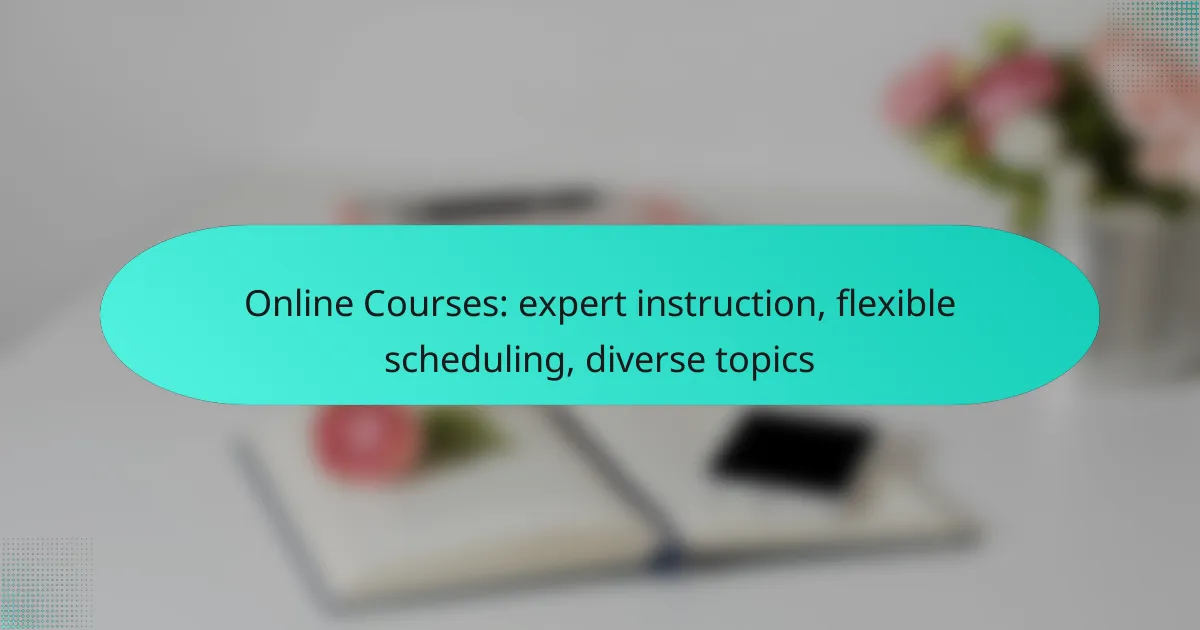Online courses provide an excellent opportunity for professional development by offering expert instruction, flexible scheduling, and a diverse range of topics. With platforms like Coursera and edX, learners can tailor their education to fit their career goals and personal interests, all while studying at their own pace.

What are the best online courses for professional development?
The best online courses for professional development offer expert instruction, flexible scheduling, and a variety of topics tailored to enhance your skills. Platforms like Coursera and edX provide structured programs that cater to different career paths and learning preferences.
Coursera professional certificates
Coursera professional certificates are designed to help learners gain specific skills relevant to their careers. These programs typically consist of a series of courses that culminate in a recognized credential, which can enhance your resume and job prospects.
When considering a Coursera professional certificate, look for programs that align with your career goals. For example, certificates in data science, project management, or digital marketing are popular choices. Each program usually requires a commitment of several months, with flexible pacing to accommodate your schedule.
To maximize your experience, engage actively with course materials and participate in community discussions. Avoid common pitfalls such as procrastination and ensure you allocate regular study time to complete the coursework effectively.
edX MicroMasters programs
edX MicroMasters programs offer a series of graduate-level courses that provide deep knowledge in specific fields. These programs are ideal for professionals looking to advance their education without committing to a full master’s degree.
MicroMasters programs typically consist of 3 to 5 courses and can take several months to complete. They cover diverse topics such as artificial intelligence, business management, and supply chain management. Completing a MicroMasters can also give you credit toward a full master’s degree at participating universities.
To succeed in an edX MicroMasters program, stay organized and set clear goals for each course. Engage with peers and instructors to enhance your learning experience. Be mindful of the time commitment, as these programs can be rigorous and require consistent effort.

How can I choose the right online course?
To choose the right online course, consider your learning goals, the course content, and the instructor’s qualifications. Evaluating these factors will help ensure that the course meets your needs and provides valuable knowledge.
Assess course content and outcomes
Examine the course syllabus to understand the topics covered and the skills you will gain. Look for courses that clearly outline their learning objectives and expected outcomes, as this will help you gauge their relevance to your goals.
Consider whether the course offers practical applications, such as projects or case studies, which can enhance your understanding. Additionally, check for any assessments or certifications that may be awarded upon completion, as these can add value to your learning experience.
Consider instructor credentials
Research the instructor’s background to ensure they have relevant expertise and experience in the subject matter. Look for qualifications such as advanced degrees, professional certifications, or significant industry experience that demonstrate their capability to teach effectively.
Read reviews or testimonials from previous students to gain insights into the instructor’s teaching style and effectiveness. A knowledgeable and engaging instructor can significantly enhance your learning experience and retention of the material.

What are the benefits of online courses?
Online courses offer expert instruction, flexible scheduling, and a wide range of topics, making education accessible to many. They cater to diverse learning needs and lifestyles, allowing individuals to pursue knowledge at their own pace.
Flexible scheduling options
One of the main advantages of online courses is their flexible scheduling. Learners can choose when to engage with course materials, making it easier to balance education with work and personal commitments.
This flexibility allows students to study during peak productivity hours, whether that’s early in the morning or late at night. Many platforms also offer asynchronous learning, meaning you can access recorded lectures and materials anytime.
When selecting a course, look for those that provide clear deadlines for assignments while allowing you to complete them at your convenience. This balance helps maintain accountability without sacrificing flexibility.
Diverse topics and specializations
Online courses cover a vast array of subjects, from technical skills like coding to creative fields such as graphic design. This diversity enables learners to explore various interests and specialize in areas that align with their career goals.
Many platforms offer courses developed by industry experts, ensuring that the content is relevant and up-to-date. You can find courses ranging from short workshops to comprehensive degree programs, catering to different levels of expertise.
When choosing a course, consider your career aspirations and select topics that will enhance your skills or knowledge in your desired field. This targeted approach can significantly impact your professional development and job prospects.

How do online courses compare to traditional education?
Online courses offer a flexible alternative to traditional education, allowing learners to access expert instruction from anywhere at their convenience. While both formats aim to provide knowledge and skills, online courses often emphasize self-paced learning and a wider variety of topics.
Cost-effectiveness of online courses
Online courses typically cost less than traditional education options. Tuition fees for online programs can range from a few hundred to a few thousand dollars, while traditional degrees often exceed several thousand dollars annually.
Additionally, online learners save on commuting, housing, and material costs. Many platforms offer free or low-cost courses, making education more accessible to a broader audience.
Accessibility and convenience
Online courses provide unparalleled accessibility, allowing students to learn from anywhere with an internet connection. This flexibility accommodates various schedules, making it easier for working professionals or those with family commitments to pursue education.
Moreover, the diverse range of topics available online means learners can find courses tailored to their specific interests or career goals, from technology to arts. This variety enhances the educational experience, catering to individual needs and preferences.

What platforms offer the most diverse topics?
Several online learning platforms provide a wide range of topics, catering to various interests and professional needs. Notable platforms like Udemy and LinkedIn Learning stand out for their extensive course offerings and specialized content.
Udemy’s extensive course library
Udemy features a vast library of courses across numerous subjects, including technology, business, arts, and personal development. With thousands of courses available, learners can find options ranging from beginner to advanced levels.
Courses on Udemy are often created by industry professionals and educators, ensuring a variety of teaching styles and perspectives. Users can purchase courses individually, allowing for flexibility in choosing topics that align with their interests and goals.
LinkedIn Learning’s industry-focused courses
LinkedIn Learning offers courses that are specifically tailored to industry needs, focusing on skills that are in high demand. This platform provides access to courses in fields such as software development, marketing, and project management.
With a subscription model, LinkedIn Learning allows users to explore multiple courses without additional costs per course. This can be particularly beneficial for professionals looking to upskill or pivot their careers, as they can access a broad range of relevant content in one place.

What are the prerequisites for enrolling in online courses?
Prerequisites for enrolling in online courses typically include basic computer skills and reliable internet access. Understanding these requirements can help ensure a smooth learning experience.
Basic computer skills
To succeed in online courses, students should possess fundamental computer skills. This includes the ability to use a web browser, navigate learning management systems, and manage files and documents.
Familiarity with common software applications, such as word processors and spreadsheets, is also beneficial. These skills enable students to complete assignments, participate in discussions, and utilize course resources effectively.
Internet access requirements
Reliable internet access is crucial for participating in online courses. A stable connection allows students to stream lectures, download materials, and engage in interactive activities without interruptions.
Most courses recommend a broadband connection with speeds of at least 1 Mbps for optimal performance. Students should also ensure they have access to a device capable of running necessary software and applications.

How do I evaluate the quality of an online course?
To evaluate the quality of an online course, consider student reviews, ratings, and the course’s accreditation status. These factors provide insight into the course’s effectiveness, credibility, and overall value.
Check student reviews and ratings
Student reviews and ratings are crucial indicators of an online course’s quality. Look for platforms that aggregate reviews, such as Course Report or Trustpilot, where you can find feedback from past participants. Aim for courses with a high average rating, typically above four stars, and read both positive and negative reviews to gauge the overall experience.
Pay attention to recurring themes in the reviews. If multiple students mention the same strengths or weaknesses, it’s likely a reliable indicator of what to expect. Consider the number of reviews as well; a course with hundreds of reviews may provide a more balanced perspective than one with only a handful.
Look for accreditation and partnerships
Accreditation and partnerships can significantly enhance an online course’s credibility. Courses offered by accredited institutions or those partnered with reputable organizations often adhere to higher educational standards. Check if the course is affiliated with recognized universities or industry leaders, as this can indicate a commitment to quality.
Research the accrediting bodies relevant to the course’s subject area. For example, courses in healthcare may need to meet specific standards set by professional organizations. Accreditation not only assures quality but may also be important for your career advancement, especially in regulated fields.

What are the emerging trends in online education?
Emerging trends in online education include personalized learning experiences, increased use of artificial intelligence, and a focus on micro-credentials. These trends reflect a shift towards more flexible, tailored educational opportunities that cater to diverse learner needs.
Personalized Learning Experiences
Personalized learning allows students to engage with content that matches their individual learning styles and paces. This approach often utilizes data analytics to assess student performance and adapt coursework accordingly, enhancing the overall learning experience.
For example, platforms may offer adaptive quizzes that change difficulty based on a learner’s previous answers. This customization helps keep students motivated and improves retention rates.
Increased Use of Artificial Intelligence
Artificial intelligence (AI) is becoming integral in online education, providing tools for automating administrative tasks and offering personalized feedback. AI-driven chatbots can assist students with queries outside of traditional hours, making support more accessible.
Additionally, AI can analyze student interactions to identify areas where learners struggle, allowing educators to intervene early and tailor their teaching strategies. This proactive approach can significantly enhance student outcomes.
Focus on Micro-Credentials
Micro-credentials are short, focused courses that allow learners to gain specific skills quickly. This trend responds to the demand for skills-based education, particularly in fast-evolving industries where traditional degrees may not suffice.
Many online platforms now offer these bite-sized courses, often recognized by employers. For instance, a digital marketing micro-credential can help professionals upskill without committing to a full degree program, making education more accessible and relevant.
